- Home
- Pam Weaver
Better Days Will Come Page 11
Better Days Will Come Read online
Page 11
She followed him to the gate and after a few more sharp words, she locked the gate noisily.
‘Don’t invite that man back in here again,’ she said accusingly as she walked through the kitchen.
‘Perish the thought, Madam,’ said Cook innocently. Lady Brayfield swept out of the room. The doorbell was ringing as she opened the kitchen door. ‘Don’t worry, Dora,’ she called over her shoulder. ‘I’ll see to it.’
Bonnie took the holly into the sitting room and she and Richard laid it on the mantelpiece and along the picture rails. After that, she helped him wrap his Christmas presents. Richard had bought his grandmother a pretty headscarf and his mother a brooch and some perfume. The child had gone up in Bonnie’s estimation when he had happily spent the whole of his £5 on the two women. Thank goodness Lady Brayfield had enough spare coupons although Bonnie suspected most of them had come from Richard’s mother. Being incarcerated in the home meant that she had no opportunity to go out or buy new clothes.
After luncheon Bonnie had taken Richard to the pictures, her special Christmas treat for him. She chose Hue and Cry, a story about a gang of boys who manage to foil a master crook, and for a couple of hours Bonnie quite forgot her own problems. Richard was on the edge of his seat and thoroughly enjoyed himself.
Back home they had tea and then played card games until bedtime. By the time she had got him settled, Bonnie was tired. Of course, George was never far from her thoughts. She wavered between feeling frantic with worry because she didn’t know what had happened to him and angry that he’d left her pregnant and alone. Her heart was heavy and she was very homesick. Did Mum and Rita miss her? She lay staring at the ceiling as she relived some of those precious moments with George and thelong walks she’d enjoyed with Rita along Worthing sea front.
She had been to the post office earlier in the day and to her delight there was a letter from Miss Reeves. Bonnie saved it until she was alone in her room.
Dear Bonnie,
I must say I was quite surprised to get your letter and more than a little alarmed that you have left home so abruptly. I have seen your mother in passing but she was reluctant to talk about you, merely saying you were doing well and that you might be coming home shortly. Against my better judgement, but in deference to your wishes, I was very careful not to tell her that you had been in touch with me. Now that I have received your letter, I must ask you to reconsider. It seemed awfully cruel not to inform your mother that you are as well and happy as you indicate.
From what I can gather, from the short conversation I had with your mother, your sister has left school early and is working in Hubbard’s. I’m sure this must be a disappointment to your mother because she did so want Rita to go to secretarial college, but times are hard and we must all do our bit.
Bonnie, for whatever reason you have left home, I’m sure you can patch it up. This is the season of goodwill, and Christ came so that we might be reconciled one to another. Won’t you reconsider your plans? Let me know if I can help in any way.
Be assured of my prayers, my dear. Come home soon.
Yours sincerely,
Evelyn Reeves.
The pain Bonnie experienced was acute. She felt as if someone had hit her with a ten-foot pole. Because of her, Rita had had to give up her chance of a career. Of course, it was obvious. Mum would have needed her wages to pay the rent. Bonnie felt an absolute heel and there was nothing she could do about it. Even if she went back home, she would only be a burden to them. With a baby on the way, how could she pull her own weight or do her share? There was no way Mum could support her. No, she would have to stay away from home for a long time, perhaps even for good. She threw herself onto the bed and wept bitter tears into her pillow.
The postman came late on Christmas Eve. Grace heard the letterbox rattle and found one envelope on the mat. The card inside was a pretty one with lots of glitter. She opened it, looked at the signature and swayed. To Mum and Rita, all my love Bonnie. There were two big ‘X’s at the bottom. Grace turned it over and looked at the back of the card. No address, only the price, written in pencil in the right-hand corner: 8½d. She sat down at the kitchen table, held it to her chest and rocked herself gently.
When Grace came down on Christmas morning, Rita was sitting on the stairs. Grace gathered her skirt and sat beside her.
‘Happy Christmas, love.’
‘Happy Christmas, Mum.’ Rita’s voice was thick with emotion. Grace put her arm around her daughter and Rita laid her head on her mother’s shoulder. ‘I miss her, Mum.’
‘I know,’ said Grace.
‘We were going to get you some new decorations this year,’ said Rita. ‘I forgot all about it.’
‘There’ll be other Christmases,’ said Grace. ‘I miss her too. I keep wondering where she is, what she’s doing, is she warm enough …’
Rita’s heart constricted. That was the last thing her mother needed to worry about. Warm enough? What else would she be in South Africa? The funny thing was, although Bonnie’s Christmas card bore the message, Across the miles … , it had a London postmark. Now was the time to say something, but Rita couldn’t. Perhaps her sister had posted it on her way to South Africa? If her mother thought of all those thousands of miles between them, she’d be a right state. She might not believe her and then she would have to tell her about Dinah and Mrs Kerr. What if her mother went charging round there? She gulped down a sob and Grace tightened her grip around Rita’s back.
‘I think we ought to make up our minds to have the best Christmas we can,’ said Grace. ‘I think Bonnie would want that, don’t you?’
Rita nodded miserably.
‘What about the money, Mum? What are we going to do? It’ll take ages to pay it.’
‘It’s all paid,’ Grace smiled.
Rita’s eyes widened. ‘But how?’
‘A friend gave me the money,’ said Grace dismissively.
‘A friend? What friend?’
‘Never you mind,’ Grace chuckled. ‘Just be thankful that nobody’s Christmas, including ours, has been spoiled.’
Rita gave her a tired smile. ‘It almost makes me believe in Father Christmas again,’ she laughed.
‘I still want to pay the money back,’ said Grace, ‘but you’re right. It’s good to know there are still a few good people left in this world.’
Rita gave her a hug. ‘I’m so glad, Mum.’
‘The neighbours will be round later,’ Grace went on. ‘We don’t have the piano but we can still have a high old time. Snowy will be here soon so we’ve got plenty to do.’
Rita nodded again.
Grace stood up and, taking her hand, said, ‘We can only hope your sister’s having a good time and we’ll make the best of it too.’
When Bonnie woke up on Christmas morning, she could smell bacon cooking and hear Richard’s excited cries as he unwrapped his presents. It took several seconds before she realised she wasn’t dreaming. She glanced at the clock. It was almost eight. She’d overslept.
By the time she got downstairs, breakfast was almost over. ‘I do apologise, Lady Brayfield,’ said Bonnie.
‘No need,’ said Lady Brayfield cheerfully. ‘Happy Christmas, Bonnie.’
Bonnie returned the compliment and as soon as they’d finished the meal, Lady Brayfield suddenly announced that she and Richard were going to spend the day with Richard’s mother so Bonnie, Cook and Dora could have the house to themselves. It would have been nice to have been given some notice, Bonnie thought crossly, but she didn’t say anything.
Until his grandmother was ready, Bonnie helped Richard set up his new clockwork Hornby train set on the dining room floor. He was reluctant to leave the train so she exercised the dog alone. She was glad to be on her own and as she walked around Hyde Park she let her tears fall freely. When she got back to Aldford Street, Bonnie felt a lot better. Lady Brayfield and her charge had already gone.
The house was already filled with an appetising smell. Bonnie cleared up the sitti
ng room and tidied away the Christmas wrapping paper. She folded it neatly and put it into the laundry room. She would iron it flat before putting it away for next year. The paper shortage was so severe, who knew if they’d be able to buy any Christmas wrapping paper for Christmas 1948? By 12.30 the smell of roast chicken had her drooling and Bonnie realised how hungry she was. Although they had the run of the house, the three of them sat in the kitchen where they felt the most comfortable.
‘This chicken looks more like a pigeon,’ Cook grumbled as she brought it to the table. She flicked off the radio and the BBC light programme, Forces Favourites, died instantly.
‘It looks fantastic,’ Bonnie insisted. Her voice was thin. She was struggling not to let her feelings of homesickness overwhelm her.
Cook went back to the stove to fetch the gravy. Dora reached over and squeezed Bonnie’s hand. It was a move which took Bonnie by surprise.
‘I heard you last night,’ Dora whispered earnestly, her lined and care-worn face full of concern.
‘Sorry?’
‘You was crying.’
Embarrassed, Bonnie looked away.
‘Don’t worry,’ Dora went on. ‘I’ll be your friend.’
Bonnie looked at her and smiled, suddenly very grateful for such sincere and genuine friendships. ‘Thank you, Dora,’ she said simply. ‘I’d like that very much.’ And Dora beamed.
After the meal, they exchanged presents. Cook had given Bonnie a box of three handkerchiefs. They were brand new, very pretty and embroidered in one corner. Dora gave her some talc. Bonnie was delighted with both gifts. She in turn had given them an apron and a tin of toffees. Lady Brayfield had left them each a slim, flat gift. When they opened them, they had all been given the same thing. Stockings.
Bonnie suppressed a smile.
‘Oooh,’ said Dora. ‘Aren’t they lovely.’
‘Crafty old devil,’ murmured Cook.
The day had gone very quickly in Worthing. Snowy had come for dinner just before Grace dished up. She was lavish in her praise of their meagre decorations and Grace showed her Bonnie’s card which had pride of place on the mantelpiece.
‘I’m so glad you’ve heard from her,’ said Snowy giving Grace an encouraging squeeze of her arm. ‘At least you know she’s all right.’
Grace had the radio tuned to the Light Programme. She was just about to switch it off when Jean Metcalfe said, ‘And now we have a request for Mum and Dad, Dougie and Mo Dawson in Worthing. It comes from Bob to wish you a very happy Christmas. Bob says, “I’ll be thinking of you especially when you all gather at Rita’s house for tea. Have a wonderful time and I’ll see you all at Easter.”’
Everybody froze as the strains of Vera Lynn singing, ‘We’ll meet again’ filled the room.
‘Well I never!’ gasped Snowy as the song finished. ‘I had no idea they played records for real people. I thought they made everything up.’
‘Wasn’t that nice,’ smiled Grace. ‘I suppose his mum and Mo must have told him we’d invited them for Christmas.’
‘He said my name,’ Rita murmured. ‘I’m famous.’
And they all laughed.
There wasn’t a chicken to be had anywhere so they made do with rabbit pie, roast potatoes and a cabbage from Snowy’s garden. Grace still had a little sherry left over from some other celebration. The two women had a small glass each and Rita drank homemade ginger beer. For pudding they enjoyed a couple of mince pies and as soon as the washing up was done, they listened to the King’s Speech from Sandringham on the Home Service.
The older women drank tea and dozed while Rita wrote her obligatory thank you letters. One to Miss Reeves to thank herfor a pretty ornament for her dressing table, and one to Granny who lived in Kirkbymoorside in Yorkshire to thank her for the matching scarf and gloves she had knitted (she did the same every year).
‘Anything you want to say to Granny, Mum?’
‘Leave the envelope open,’ Grace yawned. ‘I’ll put a letter in tomorrow.’
Finally Rita wrote to Salvatore and Liliana Semadini to thank them for the small purse they had sent her. When she had opened it, Rita found a coin inside.
‘Why did they put a tanner in there?’
‘To bring good luck,’ said Grace. ‘So that your purse will never be empty.’
At four they got ready for tea. Rita made some fish paste sandwiches while Snowy put out the plates, cups and saucers. Grace fixed the darts board on the wall.
As the neighbours came, the table began to fill. Sausage rolls from Elsie her next-door-but-one neighbour, and a tin of snoek (some sort of fish from Africa which the government said was as good as salmon). Grace and Snowy weren’t convinced by the snoek. They didn’t know how to say the name and when they tried to pronounce it, it sounded an awful lot like ‘snot’, which didn’t really help matters, but they mixed it with salad cream and made some more sandwiches. Dougie was happy to help them and he managed to butter some bread very well.
‘You’ve done a good job there, Dougie,’ said Snowy, and the lad’s eyes lit up.
‘Any news of Bob?’ Grace asked.
‘He gets his demob at Easter,’ said his mother. ‘He sends his regards to Rita.’
‘Oh yes, we heard it on the radio,’ said Grace with a grin.
Rita brought some of her old toys downstairs and Grace produced a bag of dressing-up clothes, and a long mirror which had once been the door of a wardrobe. Before long the kids were having a whale of a time. More goodies appeared on the table, including a small trifle, a jelly in the shape of a wobbling red and green tower, and a few sweets. Kaye Wilcox turned up from work. She kissed Grace and gave her a tin of toffees for the party.
‘Are you all right, Grace?’ she said anxiously.
‘I’m fine,’ Grace assured her. ‘It’ll take more than a bump on the head to put me down.’
Kaye sat at the kitchen table talking to Peggy Jones. Grace finally remembered to return the penny she’d lent her for the platform ticket the day Bonnie left.
‘Oh you needn’t have bothered,’ said Peggy. ‘I was glad to help. Any news of Bonnie?’
Grace shook her head and fortunately Miss Reeves arrived so she was spared having to give an explanation. Soon after, Liliana and Salvatore turned up with some pastries and the little house was full.
‘Grace,’ said Salvatore gravely. ‘I must ask you something.’
‘Fire away,’ Grace smiled. She liked Salvatore. A rotund man, he was an effervescent character, loud and colourful, but everybody knew he had a heart of gold. Apart from a brief period when he and Liliana had been interned on the Isle of Man during the war, they had lived in Worthing since they were young. When the authorities carted them off, no one in the town could believe that Salvatore and Liliana could be anything other than a very nice couple, totally innocent of the aspersions levelled against them.
Grace looked up from the table where she had been arranging some pickled beetroot and pickled onions on the dish. Liliana let out a little gasp and Grace put her hand up to her face. For a second or two, she had quite forgotten her bruises. When they heard what had happened to Grace just around the corner from them in Station Approach they were shocked.
‘I’m fine now,’ said Grace. ‘Rita looked after me very well. What was it you wanted to tell me?’
‘I no wish to take advantage but my nephew, Emilio, he come for to live with us.’ Salvatore took the arm of a young man standing behind him and pulled him forward. Emilio smiled and, taking Grace’s hand, leaned over to kiss it.
‘Pleased to meet you,’ said Grace. He was incredibly good looking with dark curly hair and a generous mouth. He was smartly dressed in a suit, a crisp white shirt and a blue tie.
‘Emilio, he come from Italy,’ said Salvatore. ‘His papa, my brother, send him to me. Things very bad in Italy and Emilio, he want the better life.’
‘You’re very welcome,’ Grace nodded. She turned and called, ‘Rita.’
Her daughter was talking to Ka
ye. The girl wasn’t looking her normal vivacious self and Grace wondered why.
When Liliana saw Rita, she cupped her chin in her hand and kissed both her cheeks. ‘You are good girl to your mama,’ she gushed.
That was when Rita saw Emilio. Grace saw the colour rising to her daughter’s cheeks. It was hardly surprising. There weren’t many young men as good looking as Emilio in Worthing. Tall, with large dark eyes and amazingly long eyelashes for a man, he had the physique of a Roman god and all the charm of a film star.
‘Offer everyone a drink,’ said Grace, giving Rita a nudge in the ribs. She winked at Liliana and the two women shared a knowing smile.
There was another knock at the door and Dinah walked in. Everyone was transfixed as Rita introduced her. ‘Dinah works as the mannequin in Hubbard’s.’
‘That’s never Alice Chamberlain’s granddaughter, is it?’ Elsie Dawson asked Grace in a loud whisper.
‘Yes, I am,’ smiled Dinah. ‘I’m surprised you recognised me, Mrs Dawson. It must be more than fifteen years since I was here and I was only a little girl then.’
‘Alice missed you something rotten,’ Elsie sniffed.
‘As I did her,’ said Dinah. ‘After my parents went their separate ways, my father told me my granny had died.’
‘A wicked lie,’ Elsie blurted out.
‘I tend to agree, Mrs Dawson,’ said Dinah, ‘but my father had his reasons.’
‘Didn’t you go to live up north somewhere?’ Grace asked.
‘Hardly,’ Dinah chuckled. ‘My father took me to Petworth.’
‘Of course, you do know your granny died in November, don’t you?’ Grace said gently.
‘Yes,’ said Dinah. ‘That’s really why I’m here. She left me her house.’
‘You mean it wasn’t rented?’ Elsie gasped. ‘I thought Norris Finley had all the houses around here.’
‘Not my granny’s,’ Dinah smiled.
Rita’s eyes lit up. ‘Does that mean you’re going to live just across the street?’

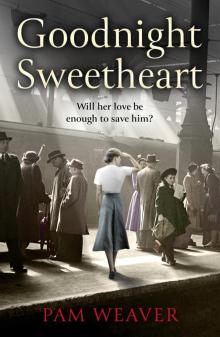 Goodnight Sweetheart
Goodnight Sweetheart At Home by the Sea
At Home by the Sea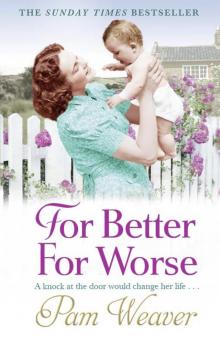 For Better For Worse
For Better For Worse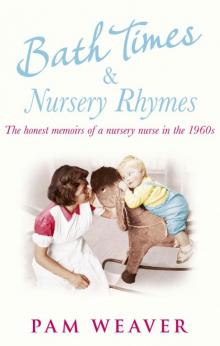 Bath Times and Nursery Rhymes
Bath Times and Nursery Rhymes Love Walked Right In
Love Walked Right In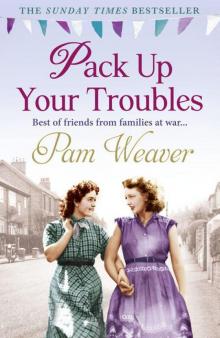 Pack Up Your Troubles
Pack Up Your Troubles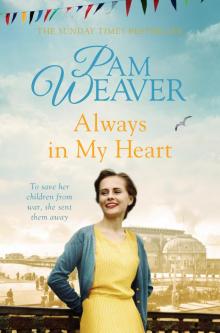 Always in my Heart
Always in my Heart Sing Them Home
Sing Them Home Amy's Seaside Secret
Amy's Seaside Secret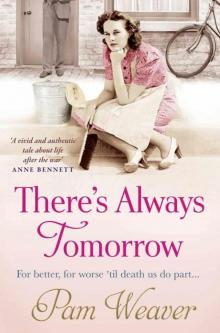 There’s Always Tomorrow
There’s Always Tomorrow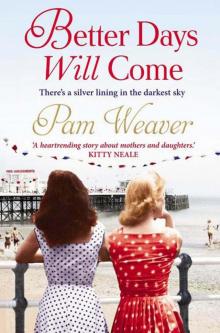 Better Days Will Come
Better Days Will Come Family Drama 4 E-Book Bundle
Family Drama 4 E-Book Bundle